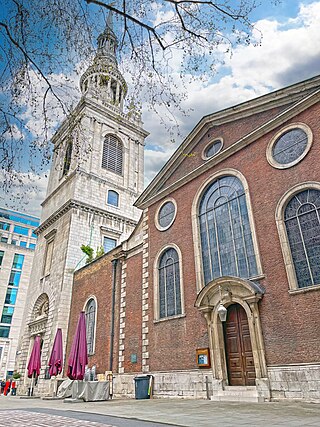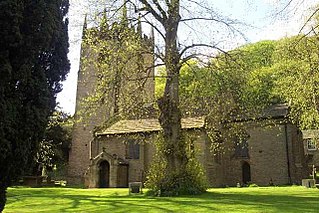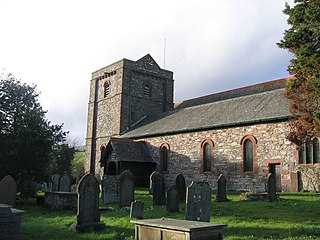
The Church of St Mary-le-Bow is a Church of England parish church in the City of London, England. Located on Cheapside, one of the city's oldest thoroughfares, the church was founded in 1080, by Lanfranc, Archbishop of Canterbury. Rebuilt several times over the ensuing centuries, the present church is the work of Sir Christopher Wren, following the Great Fire of London (1666). With its tall spire, it is still a landmark in the City of London, being the third highest of any Wren church, surpassed only by nearby St Paul's Cathedral and St Bride's, Fleet Street. At a cost of over £15,000, it was also his second most expensive, again only surpassed by St Paul's Cathedral.

St Olave's Church, Hart Street, is a Church of England church in the City of London, located on the corner of Hart Street and Seething Lane near Fenchurch Street railway station.

The Church of St Mary Magdalene in Hucknall, Nottinghamshire, is a parish church in the Church of England dedicated to Jesus' companion Mary Magdalene. The church is Grade II* listed as it is a particularly significant building of more than local interest.

Adlestrop is a village and civil parish in the Cotswolds, 3 miles (5 km) east of Stow-on-the-Wold, Gloucestershire, England, on the county boundary with Oxfordshire. The River Evenlode forms the southwest boundary of the parish. The village is on a stream that flows southwest to join the river.

St Leonard's, Shoreditch, is the old parish church of Shoreditch, often known simply as Shoreditch Church. It is located at the intersection of Shoreditch High Street with Hackney Road, within the London Borough of Hackney in East London. The current building dates from about 1740 and is Grade I listed. The church is mentioned in the line ""When I grow rich", say the bells of Shoreditch" from the nursery rhyme Oranges and Lemons.

St Nicholas Church in Thames Ditton, Surrey, England, is a Grade I listed Anglican parish church that has parts that date back to the 12th century.

St Mary's Church is an Anglican church at the end of a lane to the south of the village of Nether Alderley, Cheshire, England. It dates from the 14th century, with later additions and a major restoration in the late-19th century. The church is recorded in the National Heritage List for England as a designated Grade I listed building.

St Christopher's Church is in the small village of Pott Shrigley, Cheshire, England. The church is recorded in the National Heritage List for England as a designated Grade I listed building. It is an active Anglican parish church in the diocese of Chester, the archdeaconry of Macclesfield and the deanery of Macclesfield.

The Somerset towers are a collection of distinctive, mostly spireless Gothic church towers in the county of Somerset in south west England.

St Mary Magdalene Woolwich is an 18th-century Anglican church dedicated to St Mary Magdalene in Woolwich, southeast London, England.

The Church of St Michael and St Mary Magdalene, is the Parish Church of Easthampstead, Berkshire. The ethos of the parish is one of traditional worship allied to a liberal theology and inclusive approach to both social issues and theology. The church supports a large and growing congregation with activities and study groups for all ages.

The Church of St Mary Magdalene in Chewton Mendip, Somerset, England, was built in the 1540s and has been designated as a Grade I listed building. It is dedicated to Jesus' companion Mary Magdalene.

Taunton Minster (St Mary Magdalene church) is a Church of England parish minster church in Taunton, Somerset, England, dedicated to Jesus' companion Mary Magdalene. It was completed in 1508 and is in the Early Tudor Perpendicular Gothic style. It is designated as a Grade I listed building. It is notable for its very tall tower.

St Mary Abbots is a church located on Kensington High Street and the corner of Kensington Church Street in London W8.

The church of St Laurence, Upminster, is the Church of England parish church in Upminster, England. It is a Grade I listed building. It is the historic minster or church from which Upminster derives its name, meaning 'upper church', probably signifying 'church on higher ground'. The place-name is first attested as 'Upmynster' in 1062, and appears as 'Upmunstra' in the Domesday Book of 1086.

St Mary Magdalene's Church is in Broughton-in-Furness, Cumbria, England. It is an active Anglican parish church in the deanery of Furness, the archdeaconry of Westmorland and Furness, and the diocese of Carlisle. Its benefice is united with those of four other local parishes. The church, dedicated to Jesus' companion Mary Magdalene, is recorded in the National Heritage List for England as a designated Grade II listed building.

St Mary Magdalene, Richmond, in the Anglican Diocese of Southwark, is a Grade II* listed parish church on Paradise Road, Richmond, London. The church, dedicated to Jesus' companion Mary Magdalene, was built in the early 16th century but has been greatly altered so that, apart from the tower, the visible parts of the church date from the 18th, 19th and early 20th centuries.

St Peter's Church is the parish church of the town of Barnstaple in North Devon, England. Parts of the church date to the 13th-century with much restoration during the Victorian era by George Gilbert Scott and later by his son John Oldrid Scott which changed the atmosphere of the building, although many fine wall monuments and tablets remain. The church comes under the Diocese of Exeter.

St Mary the Virgin is the Church of England parish church for East Barnet within the Diocese of St Albans. It is located on Church Hill.

St Mary Magdalene, Enfield, is a Church of England church in Enfield, London, dedicated to Jesus' companion, Mary Magdalene. The building is grade II* listed with Historic England.























